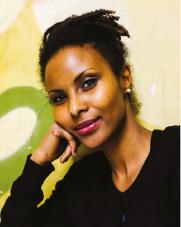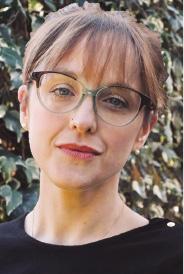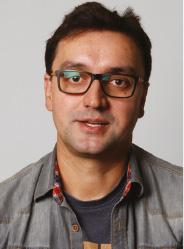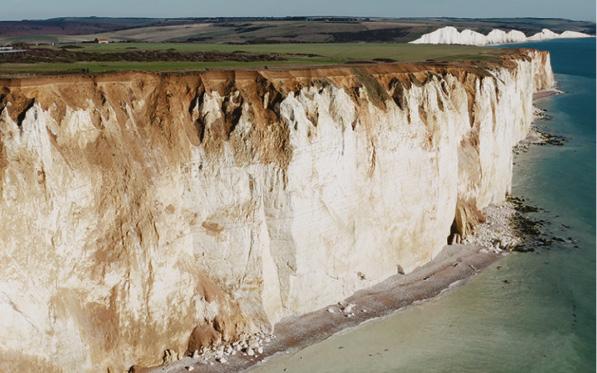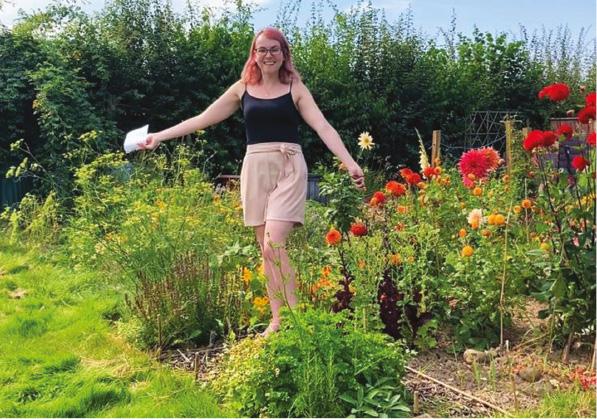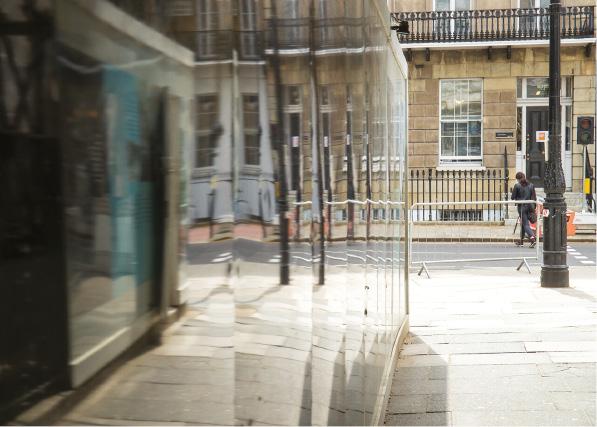Welcome to the Director’s report for the UCL Institute of Archaeology and to Archaeology International for the academic year 2021–22. After eight years of service, this is my last in this role. Earlier this year Kevin MacDonald (Figure 1) was announced as the new Director of the Institute from 1 September 2022 for a five-year term in the first instance.
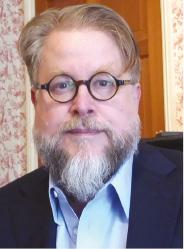
The new Institute of Archaeology Director, Kevin MacDonald, 2022 (Source: photograph by Emma MacDonald)
I pass on all my best wishes to Kevin as he leads our Institute community forward. I will be having an 18-month sabbatical, to allow me the time and space to reinvigorate and publish my various research activities, while still maintaining a few administrative tasks. Equally, I look forward to re-joining my Institute colleagues fully in 2023–24.
The 2021–22 academic year got underway successfully with a return to largely face-to-face teaching, together with some online elements. The central UCL campus, including our Gordon Square building, was open for business again and a welcome re-establishment of some form of normality! Staff and student fieldwork was mostly able to go ahead and Archaeology South-East (ASE) activities in support of the construction sector continued, following established UCL/ASE Covid-19 Risk Assessments in all cases.
Despite some enduring challenges, students and staff were impressively productive. We are proud to remain ranked third in the world for Subject in the QS World Rankings and second in the UK in The Guardian’s University Guide 2022 League Table of the 42 institutions teaching archaeology. We maintain an unparalleled range of expertise and diverse activities, a selection of which from the 2021–22 academic year are presented below, evidencing the breadth of our teaching, research and engagement with the wider world.
This year UK institutions received the results of the Research Excellence Framework (REF) 2021. This was an immense undertaking, made more complex due to Covid-19 disruption and involving large numbers of staff working collaboratively to finalise institutional submissions. It is heartening to see the strength of archaeology as a discipline and the world-leading research activities being undertaken across the country. The Institute’s submission was the largest in the subject area and we were categorised first in the UK for research power. At an institutional level, UCL was ranked second in the UK. Further details about UCL research impact can be viewed on the REF hub.
As I intimated in last year’s report, we have begun recruiting the first posts to deliver our new flagship BA Heritage programme. The new campus has now opened at UCL East, at East Bank on the Queen Elizabeth Olympic Park; a number of UCL degree courses have already commenced in September 2022 while the Institute of Archaeology’s BA Heritage will commence in September 2023. This campus will complement UCL’s central London Bloomsbury campus. Sada Mire (Figure 2), the first of two associate professors in heritage studies (UCL East), joined us in the spring term and Johanna Zetterstrom-Sharp will take up the second post in November 2022. While the Institute is its home department, the degree involves five departments across the Faculty of Social and Historical Sciences. It will train students in the core theories, methods and practical skills of heritage studies. Taught in collaboration with V&A East and the National Trust, it will utilise state-of-the-art specialist object-based learning facilities, conservation and media laboratories and collections on the Olympic Park site.
This is a completely new kind of degree and a significant innovation in multi-disciplinary heritage teaching. Having been formulated from the ground up, it breaks significantly from conventional models of heritage training in which heritage functions as a sort of applied addition to another discipline, such as archaeology or public history. Led by Rodney Harrison, this has been eight years in the making, for the past two of which he has been joined by Rachel King as academic co-lead on the programme. This new degree will allow students to explore heritage in all its forms, with a view to building a brighter future by learning from the past.
More widely the Institute contributes to UCL’s partnership with the National Trust, with a particular focus on heritage conservation research. Sarah Wolferstan (Project Manager, UCL Centre for Applied Archaeology) undertook a research secondment at the National Trust as part of UCL’s strategic partnership to evaluate participatory archaeology by exploring the impact of archaeology projects on volunteers’ wellbeing.
We also continued to invest very substantially in our Bloomsbury facilities, ensuring that we retain one of the best-equipped university-based archaeological science laboratories in Europe. In the most recent round of UCL’s Research Capital Infrastructure Funding (RCIF), we were successful in obtaining funding to acquire equipment to support fieldwork: professional grade UAV with LiDAR; global rapid heritage documentation field kit; technical imaging field kit; and SENSYS magnetometer cart system. We have also obtained funding for the future-proofing and further development of our laboratories/analytical capabilities, including a Raman spectroscopic microscope, a new Institute of Archaeology/Geography thin section facility, environmental archaeology research microscopes, Wolfson Lab sampling equipment and further investment in the development of biomolecular facilities.
Promotions, new academic and technical staff and leavers
The Institute is pleased to announce the success of Mark Altaweel (Figure 3A), Andrew Gardner (Figure 3B), Rachel King, Louise Martin (Figure 3C), Theano Moussouri (Figure 3D), Claudia Naeser and Miljana Radivojevic in UCL’s Senior Academic, Research and Teaching Promotions. Rachel, Claudia and Miljana have been promoted to Associate Professor while Mark, Andrew, Louise and Theano have all been promoted to Professorships (promotions effective 1 October 2022).
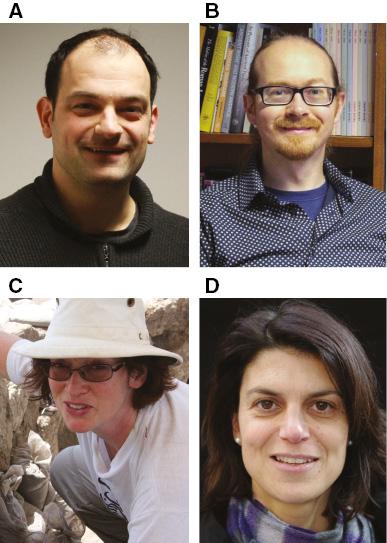
(A) Mark Altaweel (Source: photograph by Charlotte Frearson); (B) Andrew Gardner (Source: photograph by Lisa Daniel); (C) Louise Martin (Source: photograph by Boncucklu Project); (D) Theano Moussouri (Source: photograph by Lisa Daniel)
This academic year we welcomed a number of new staff, including new academics Katie Hemer (Lecturer in Bioarchaeology and Forensic Anthropology; Figure 4) and Sada Mire (Associate Professor in Heritage Studies; Figure 2) (UCL East, see p. 2 of this volume).
In the laboratories we welcomed Russell Bailey (Senior Technician in Scanning Electron Microscopy and X-ray Microanalysis) and Victoria Lucas (Technician in Archaeomaterials Preparation and Analysis). We are also pleased to announce that we have appointed Antonio Reis (Figure 5) as Technician in Photographic and Digital Heritage Imaging. Some of you will already know Antonio in his work as Heritage Photographer and Illustrator for ASE.
We also welcomed new postdoctoral researchers and teaching replacement staff, including Delphine Fremondeau (previously technical support in the Isotope Laboratories, now a part-time Leverhulme Trust Research Fellow working with Rhiannon Stevens); Francesca Fulminante (Associate Lecturer [Teaching] in Iron Age Mediterranean Archaeology), who is covering Corinna Riva’s research leave during 2021–22; Hallvard Indgjerd, who has joined us to undertake research on Corisande Fenwick’s ERC Everyday ISLAM project; Jan Kolar, who is undertaking research on Stephen Shennan’s ERC Synergy COREX project; Eloise Noc, who has joined us to work with Kevin MacDonald on the Arcadia-funded project (led by Cambridge) on Mapping Africa’s Endangered Archaeological Sites and Monuments; Robert Staniuk, who has also joined us to undertake research on Stephen Shennan’s ERC Synergy COREX project; and Paul Wordsworth (Associate Lecturer [Teaching] in Islamic Archaeology), who is covering Corisande Fenwick’s research leave until the end of 2025.
In addition to research staff whose projects and limited period Fellowships have come to their end or who have obtained permanent academic positions elsewhere – Andrew Dufton, Eval Mol and Peter Schauer – we were also sad to say goodbye to professional support staff members Agnese Benzonelli, Cécile Brémont and Tom Gregory, all of whom have been absolutely excellent in their various positions. We thank every one of them for their service to the Institute and UCL.
Awards and recognition
Institute staff, honorary associates and students, both individually and for specific projects, continue to be recognised through an impressive array of awards and esteem indicators. These include significant media interest, leadership of national/international panels and publication awards.
Collaborative research involving Stuart Brookes was nominated for a Current Archaeology award for 2022. The innovative landscape project led by Stephen Mileson (University of Oxford) with Stuart explores medieval peasant perceptions of landscape and was nominated in the Research Project of the Year 2022 category.
Ian Freestone was invited to open the UN International Year of Glass with a presentation in Geneva in February 2022 of a lecture entitled ‘How it all began: The invention and re-invention of glass in the ancient world’.
Andrew Gardner has been appointed as co-Chair (with Vicki Cummings) of University Archaeology UK. UAUK represents the departments of Archaeology in UK universities and promotes archaeology as an established, recognised and relevant academic discipline within higher education while providing a means to respond to any consultations and proposals from government and other bodies (see p. 12 for this year’s University Archaeology Day). Andrew was also invited to participate in an interdisciplinary panel event hosted by the Centre for Practice Theory at Lancaster in February 2022. The panel considered issues concerning practice, practice theory and the study of practices in archaeology, as well as the implications of these matters for the investigation of practices more broadly.
Institute research has also been contributing to climate change research, policy and practice. Rodney Harrison was invited to be one of UCL’s representatives at COP26, the UN Climate Change conference, held in Glasgow in November. At the conference the Arts and Humanities Research Council (AHRC)-funded research project Reimagining Museums for Climate Action, co-led by Rodney, was showcased with the launch of an open-access book and museums toolkit.
Rodney was also invited to give the 5th Annual Heritage Lecture hosted by the Cambridge Heritage Research Centre on ‘Rethinking Heritage in the Anthropocene’.
Richard Macphail was the 2021 Co-awardee (with Paul Goldberg) of the International Union of Soil Sciences 10th Kubiëna Medal for Soil Micromorphology. The Kubiëna Medal is currently awarded every four years and presented at the World Congress of Soil Science of the International Union of Soil Sciences (IUSS) meeting, held in Glasgow in August 2022.
The journal article entitled ‘The original Stonehenge? A dismantled stone circle in the Preseli Hills of west Wales’, an output from collaborative research led by Mike Parker Pearson, has been awarded the Ben Cullen Prize from Antiquity for 2022. The prize-winning article was originally published in the February 2021 issue of Antiquity by a collaborative authorship team and is available to read for free via the Antiquity website.
Keeping with Stonehenge, research published recently in the journal Parasitology revealed parasites in prehistoric faeces from feasting near the monument. Details of the open-access research paper are as follows: Mitchell, Piers D., Evilena Anastasiou, Helen L. Whelton, Ian D. Bull, Mike Parker Pearson and Lisa-Marie Shillito (2022). ‘Intestinal parasites in the Neolithic population who built Stonehenge (Durrington Walls, 2500 bce)’. Parasitology 149(8): 1027–33. doi:10.1017/S0031182022000476.
His Majesty King Charles III has become Patron of the restoration project to protect and preserve the ancient site of La Cotte de St Brelade in Jersey. Working with Jersey Heritage, a collaborative team led by Matt Pope initiated a new era of research at La Cotte in 2010. In addition to fieldwork, this included scientific studies of archaeological material from historic excavations, including fossil remains of Neanderthal people, now curated by Jersey Heritage. Further excavations have been taking place at the site in Summer 2022.
Stephen Shennan was awarded the Royal Anthropological Institute’s Huxley Medal for 2021 and was invited to give the Huxley Memorial Lecture on 14 December. This distinction was established in 1900 in memory of Thomas Henry Huxley (biologist and anthropologist) and is the highest honour the Royal Anthropological Institute (RAI) bestows. Stephen’s lecture was entitled ‘Population and the dynamics of culture change’ and is available to watch on YouTube.
The Stiances Archaeology Project, led by ASE’s Simon Stevens, won Youth Engagement Project of the Year at the Council for British Archaeology/Marsh Community Archaeology Awards 2022.
Alice Stevenson was invited to give the Sir Charles Nicholson Lecture 2022 at the University of Sydney in September. Her presentation was entitled Challenging Collections: Ancient Egypt in the Museum 1822–1922–2022.
The Dawn of Everything: A new history of humanity (Penguin, 2021), co-authored by David Wengrow, was shortlisted for The Orwell Prize for Political Writing 2022, the UK’s most prestigious prize in this area. The volume has been highly praised in media reviews and indeed debuted on the New York Times Best Sellers list. A number of special public events, both in the UK and internationally, have been held following the book’s launch and more are in the pipeline.
David Wengrow was invited to give one of the British School at Athens’ Annual Open Lectures for 2022 in the spring term (February). He has also been invited to give the opening Plenary Lecture at the 43rd Theoretical Archaeology Group conference (TAG43), which took place at the University of Edinburgh from 15 to 17 December 2022.
Tim Williams was awarded the Sir Richard Burton Medal 2022 by the Royal Asiatic Society of Great Britain and Ireland. This award was established in 1923, in conjunction with the Richard Burton Memorial Lecture Programme, which was set up a few years before to mark the centenary of Burton’s birth. Awardees are expected to deliver the lecture on Burton, his travels or some related topic. Tim’s lecture to the Society was entitled Along the Silk Roads of Central Asia. The Central Asian Archaeological Landscapes project, led by Tim, has been working with partner institutions across Central Asia to develop a comprehensive digital inventory of the area. Their work was featured as a case study for UCL Sustainable Development Goals (Figure 6).
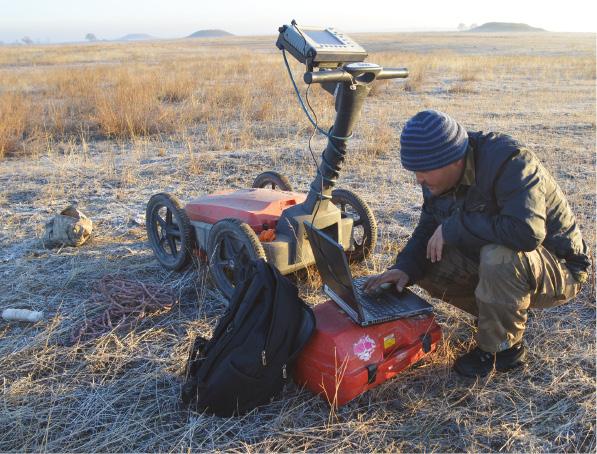
The Central Asian Archaeological Landscape project using ground penetrating radar (GPR) to explore the landscape around the Boraldai Iron Age burial mounds, Kazakhstan (Source: CAAL Project, IICAS)
Finally, congratulations to UCL Honorary Professor (and former Institute staff member) Nick Merriman, Chief Executive of the Horniman Museum, on being awarded the Art Fund Museum Prize, the world’s largest museum prize, for 2022. The award was received for their work to inspire the next generation by reconfiguring their programme after the pandemic to reach diverse audiences more representative of London and engage people in addressing the climate emergency.
Student news
I mentioned last year that ASE was documenting the placement year of Alex Allen, taking our BA Archaeology with a Placement Year degree. This year ASE have two placement students, Sakshi Surana and Victoria Igary (Figure 7), and both were interviewed after they had settled into their placements.
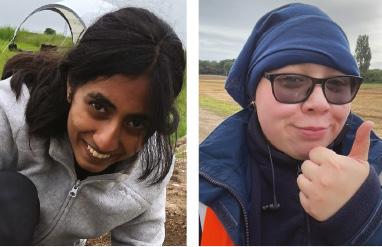
BA Archaeology with Placement Year students Sakshi Surana (left) and Victoria Igary (right) (Source: photograph by ASE)
Amanda Ford Spora (PhD student) co-produced a Manga_zine, Kushite Kingdom Manga, about ancient Sudan, together with teen artists from Harris Academy, Chobham. The comic book was launched in December. It is intended as a companion in a museum or when learning about Napatan shabtis of the Kushite kingdom, which were used as part of ancient Sudanese heritage around 2,600 years ago.
Panos Kratimenos (PhD student), whose research is concerned with shifts in burial practices around the time of the Maya ‘Collapse’, was invited to participate in a Channel 4 documentary ‘Lost Tombs of the Ancient Maya’, which followed archaeologists as they searched for clues about how the Maya lived and what happened to them. In addition to highlighting Maya burial patterns, Panos discussed the Maya writing system, calendar and codices.
Innovative research led by Michael Pittman (PhD student) used Laser-Stimulated Fluorescence (LSF) to reveal previously unseen archaeological information. LSF was used to study excavations, wall paintings, floor mosaics, church ceilings, pottery and glassware. The findings were published recently in the Journal of Archaeological Science: Reports.
Institute of Archaeology and ASE colleagues organised a spring version of Archaeo-Tech (our Experimental Archaeology course; Figure 8) at Butser Ancient Farm in Hampshire. The partnership we have recently established with Butser Ancient Farm offers a valuable opportunity for students to get involved with experimental archaeology and public engagement at this popular open-air museum, featuring experimental reconstructions of buildings and activities. This spring event provided first- and second-year undergraduates with an alternative opportunity to go to Butser two years after our usual autumn term induction week activities were cancelled due to the Covid-19 pandemic. For the academic year 2022/23, September 2022 marked the 40th anniversary of this course, originally organised by Peter Drewett in 1982, and we returned to Butser from 29 September to 2 October 2022 with our ‘normal’ Archaeo-Tech for all our new first-year undergraduate students (Figure 9).
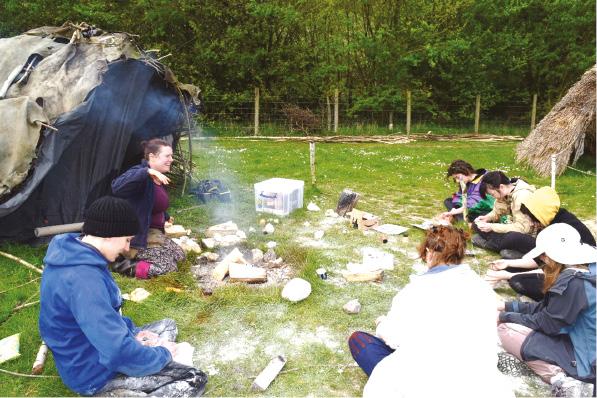
Letty Ingrey (ASE) leading a Palaeolithic art workshop at the spring 2022 event (Source: photograph by Institute of Archaeology/ASE)
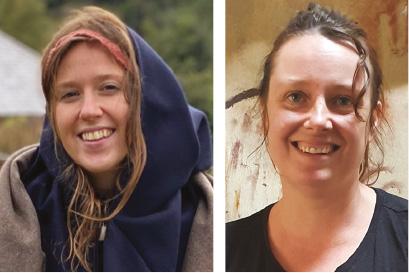
ASE team members Wiki Krzoska (left) and Letty Ingrey (right) at Archaeo-Tech (Source: photograph by ASE)
University Archaeology Day (UAD) is now in its fifth year. The idea (credited to Andrew Gardner, Charlotte Frearson and Louise Martin) won a competition at the first Institute Awayday following the uptake of my Directorship and I’m delighted by how it has gone from strength to strength. This free event is designed for prospective students, teachers and parents to learn about the many degree programmes on offer across the UK, to discover the huge range of career opportunities that an archaeology degree can lead to and to hear about some of the latest archaeological research. UAD 2021 took place online in September while the second Postgraduate University Archaeology Day took place, again online, in May 2022.
In addition to departmental events (both in person and online), Institute staff and students participated in UCL’s Undergraduate Open Days which took place in July, the first in-person events since 2019. The events, which were attended by around 16,000 visitors over two days, provided participants with the opportunity to speak to admissions staff and academic tutors and interact with current students and alumni to find out what studying at UCL is really like. Information about UCL Graduate Open events is posted on the prospective students’ website when available.
Several Institute undergraduate and graduate diploma students were awarded Departmental prizes for the 2021–22 academic session, both in specialist subject areas and also for their outstanding contributions to the life and work of the Institute.
Masters students were awarded Departmental and Faculty Prizes for the 2020–21 academic session.
Funding awards for new research
Several of our staff had their outstanding international research activities recognised by external funding and institutional awards. A small selection of them is mentioned here.
Andrew Bevan, Mike Charlton and Xiuzhen (Janice) Li have been awarded AHRC funding for their project on Qin Imperial Iron, Tomb M1 and the First Emperor’s Mausoleum: Character, Context and Consequence. Andrew (with Xiuzhen (Janice) Li, Patrick Quinn and Marcos Martinon-Torres) has also received a renewal of British Academy Research Project status and funding for their research on Imperial Logistics: The Making of the Terracotta Army.
Dorian Fuller has been awarded NERC funding for collaborative research, together with colleagues at the Royal Botanic Gardens, Kew. His work involved integrating archaeobotanical and genomic science in an investigation of evolutionary dynamics of vegetative agriculture in the Ethiopian Highlands.
Rodney Harrison and Colin Sterling (formerly at the Institute and now based at the University of Amsterdam) have been awarded AHRC funding for their innovative public engagement project Ghosts of Solid Air. The project aims to provide a new Augmented Reality experience enabling diverse audiences to understand and participate in discussions around contested statues. Rodney has also received supplementary funding from the AHRC to support ongoing work from his AHRC Priority Area Leadership Fellowship and Reimagining Museums for Climate Action activities.
A bid for an AHRC Capability for Collections Large Research Grant (CapCo) by Katie Hemer has facilitated the acquisition of new equipment to enhance scientific archaeology with connected microscopy and digital technology.
Rachel King has been awarded AHRC funding for collaborative research with the University of Oxford on Empowering Heritage: Understanding the Cultural Costs of South Africa’s Energy Futures.
Theano Moussouri has been awarded ESRC funding for collaborative research with the Korea Advanced Institute of Science and Technology (KAIST) to bring South Korea’s advances in digital technology and the digital game industry and the UK’s socially engaged museum practices into dialogue with each other.
Mike Parker Pearson is contributing his expertise to a successful AHRC-funded project, led by the University of Southampton, on Buried Landscapes of the Avon Riverside and the Mesolithic of the Stonehenge Area.
Ceri Shipton is also contributing to a successful AHRC-funded project, led by Durham University, on Digital Technologies, Acheulean Handaxes and the Social Landscapes of the Lower Palaeolithic.
Rhiannon Stevens and Hazel Reade have been awarded NERC funding for collaborative research with the University of Leeds and UKCEH for their project Unlocking Wetland Ecologies and Agriculture in Prehistory through Sulfur Isotopes.
Alice Stevenson and Yijie Zhuang have been awarded British Academy Mid-Career Fellowships during 2022–23 to facilitate the completion of a major piece of research in their respective subject areas. Alice’s project Exhibition Experiments around Egyptology: The Role of Contemporary Art will evaluate three high-profile exhibition experiments in the museum display of ancient Egypt. Yijie’s project is entitled The Power and Historicity of Water: An Interdisciplinary Investigation on the Origins of Hydraulic Societies in Late Prehistoric China.
Alice Stevenson has also been awarded AHRC funding for her research project entitled Mobilising Collections Histories for Institutional Change: Egypt at the Horniman Museum, due to start in the Autumn.
We regularly obtain small external grants and grants-in-kind to support collaborative research, fieldwork and post-excavation analyses and capacity building/impact activities. In 2021–22 these included:
Building Capacity and a National Strategy for North African Studies led by Corisande Fenwick (Society for Libyan Studies)
Looking for Landraces: Recognising Neolithic Cereal Landraces in the Western Balkans through Grain Morphometrics led by Dorian Fuller (British Academy/Leverhulme Small Grant)
Archaeology of Internment in Kenya during the Mau Mau Uprising (1952–60) led by Gabriel Moshenska (British Academy/Leverhulme Small Grant)
Exploring London’s Allotment Cultures led at UCL by Theano Moussouri (Arts Council England funding via the Museum of London)
Publication project for The Archaeological Survey on the Islands of Us, Sur and Sherari above the Fourth Nile Cataract, 2004–7, involving Claudia Naeser (Shelby White and Leon Levy Program for Archaeological Publications)
The Origins of Stonehenge: Dating an Unfinished and Dismantled Stone Circle and a Smaller Stone Circle among the Bluestone Sources in Wales by Mike Parker Pearson (NEIF–NERC–AHRC Radiocarbon analytical grant-in-kind); Mike has also been awarded funding from the Francis and Maisie Pryor Charitable Trust for his Durrington Walls and Woodhenge publication project
Funding to facilitate the creation of a series of renderings of the original appearance of the interior of a richly decorated town house in Sultan Kala (Merv), Turkmenistan by Tim Williams (British Institute of Persian Studies (BIPS) Research and Travel Grant).
We also had further UCL institutional small grant funding successes this year, including:
Building a Venture Builder for the Social Sciences led by Mark Altaweel with a colleague in UCL History (UCL Innovation and Enterprise HEIF Early-Stage Commercialisation Application)
Building the Anthropocene Archive led by Manuel Arroyo-Kalin with a colleague in UCL Geography (UCL SHS Dean’s Strategic Fund)
Developing future collaborations between academic and commercial archaeology at UCL led by Manuel Arroyo-Kalin and Dominic Perring (SHS UKRI Enhancing Research Culture Funds)
Pre-urban demography in early medieval Europe (London and Stockholm) led by Stuart Brookes (UCL GEO Cities Partnerships Programme, Seed Funds)
Creating accessible digital images for visually impaired audiences and researchers led by Rafie Cecilia and Theano Moussouri (UCL Centre for Critical Heritage Studies Small Grant). Rafie was also successful with an application to the UCL IAS Octagon Small Grants Fund to organise a seminar series on Disability and the Cultural Sector
Bones of London, UCL Widening Participation Residential Summer School led by Charlotte Frearson and Carolyn Rando (UCL Access and Widening Participation funding)
Black Atlantic Innovation Network led by UCL Institute of Advanced Studies, Sarah Parker Remond Centre with Rodney Harrison (UCL Innovation and Enterprise Knowledge Exchange Funding)
EDI [equality, diversity and inclusion] in Fieldwork: Combatting Harassment – A Student- and Staff-Organised Exhibition and Seminar Series around the Paye ta Truelle project Archaeo-Sexism led by Kayt Hawkins and Charlotte Frearson (UCL SHS Dean’s Strategic Fund)
Material Dimensions of Myth: The Archaeology of Mythology in Mediterranean History and Scholarship event co-organised by Eva Mol with colleagues at the University of Groningen (UCL Institute of Advanced Studies Call for Event Proposals)
Capacity building for young and mid-career researchers at the Department of Archaeology at the University of Khartoum/Sudan led by Claudia Naeser (UCL GEO Global Leadership Fund)
Archaeology–History–Art (AHA) Research Network re-launch: 2022 Programme: Interdisciplinary Methodologies led by Ellen Pavey, Nastassja Simensky and Beverley Butler (UCL Centre for Critical Heritage Studies Small Grant)
Evaluating Participation in Archaeology led by Dominic Perring and Sarah Wolferstan (UCL–National Trust Partnership Small Grant)
Including and Excluding: Methods and Resources in 2022 for Studying the Nineteenth- and Twentieth-Century Practices of Archaeology across Egypt, an event led by Stephen Quirke, Clare Lewis and Ikram Ghabriel (UCL Institute of Advanced Studies Call for Event Proposals)
Research, design and experimental construction of a Roman Kiln at Butser Farm, Hampshire led by Bill Sillar (UCL SHS Dean’s Strategic Fund)
London Biomolecular Archaeology Consortium (LoBArC) launch event and networking workshop led by Rhiannon Stevens (SHS UKRI Enhancing Research Culture Funds)
Reclaiming African History: Connecting Young People in London and Nairobi to Create Meaningful Research Methods led by Alice Stevenson and Rachel King (UCL Innovation and Enterprise Knowledge Exchange Funding)
Climate Change and Livelihood in the Buddhist Landscapes of Lahaul and Spiti areas of Himachal Pradesh, India led at UCL by Tim Williams (UCL–IIT Delhi Strategic Partner Funds).
Monograph and digital resource publications
For a fuller list of recent books by Institute staff, see ‘Bookshelf’ in this journal. Here I have picked out a sample to contextualise our output and touch upon the breadth of our published works. Many of these are based on new approaches and the culmination of large-scale projects. These include:
The Dawn of Everything: A new history of humanity by David Graeber and David Wengrow (Penguin, 2021). As mentioned on p. 9, this volume is an ambitious new world history, bringing together the latest scholarship and archaeological evidence to tell a new story about the last 30,000 years, fundamentally transforming our understanding of the human past.
Brenna Hassett’s new volume Growing Up Human: The evolution of childhood (Bloomsbury, 2022) explores how childhood is a critical part of the human story.
A new volume in the Middle Kingdom Studies series, The Treasure of the Egyptian Queen Ahhotep and International Relations at the Turn of the Middle Bronze Age (1600–1500 bce) , co-authored by Gianluca Miniaci (Università di Pisa and Honorary Research Fellow), was also published this year.
The first of two books documenting the archaeology of Cladh Hallan, South Uist, co-authored by Mike Parker Pearson, is now available from Oxbow Books. This first volume, Cladh Hallan: Roundhouses and the dead in the Hebridean Bronze Age and Iron Age , details the excavations undertaken by Mike Parker Pearson and colleagues at Cladh Hallan between 1989 and 2003.
The monograph resulting from the AHRC-funded Rise of Metallurgy in Eurasia project, led by Thilo Rehren, is now available (in print and open-access download) from Archaeopress. The Rise of Metallurgy in Eurasia: Evolution, organisation and consumption of early metal in the Balkans , edited by Miljana Radivojević, Benjamin Roberts, Miroslav Marić, Julka Kuzmanović-Cvetković and Thilo Rehren, is a landmark study in the origins of metallurgy.
Alice Stevenson has authored a new volume entitled Egyptian Archaeology and the Twenty-First Century Museum in the Cambridge Elements series on Ancient Egypt in Context. Alice also edited The Oxford Handbook on Museum Archaeology, published in September 2022.
New initiatives
I previously announced a new UCL Institute of Archaeology PhD series, published by BAR, which allows for rapid publication of largely unaltered Institute PhD theses. I am pleased to update that seven volumes have now been published, the most recent on subjects ranging from medieval stained-glass production to museum experiences of young blind and partially sighted visitors.
Contracts for two new UCL Institute of Archaeology book series have recently been signed with Bloomsbury, one from the UCL Institute of Archaeology World Archaeology series and the other from the UCL Institute of Archaeology Critical Cultural Heritage Series. Collectively these will showcase high-quality research across the full spectrum of world archaeology, archaeological science, heritage studies (including conservation and museum studies) and cognate disciplines. The first volume in World Archaeology series is now available: Tracing Gestures: The art and archaeology of bodily communication , edited by Amy J. Maitland Gardner and Carl Walsh. It is based on the two-day conference on Tracing Gestures: The Art and Archaeology of Bodily Communication which was held at the Institute in November 2014.
As part of Open-Access Week 2021, ASE announced that their SpoilHeap back catalogue would soon be fully available as open-access downloads. Future ASE SpoilHeap monographs will be released as hardcopy and free open-access versions at the same time.
Events
As part of our commitment to provide an outstanding research environment for staff, students and visitors, the Institute hosts and organises numerous events on many different aspects of archaeology and is linked to other heritage institutions, archaeological societies and organisations.
The Term I Institute Research Seminars normally highlight current Institute research while the Term II series is concerned with a thematic topic. In 2021–22 the thematic series was concerned with Ethical Challenges in Researching (Il)licit Antiquities. The series, which took place online via Zoom, brought together scholars from a range of disciplinary backgrounds to discuss policies, data collection and publication, material analysis and sociological modelling of trafficking networks, artefact status and human agencies involved in dealing with looted material nationally, internationally and transnationally. The first event took place in January 2022 and was concerned with cultural property crime and human security.
In addition to regular seminars organised by Institute research networks and centres, and to subject-area studies, the following should also be noted:
UCL Centre for Critical Heritage Studies (CCHS) special events:
Print Style Evolution in Sierra Leone Talk & Entertainment event (October 2021)
A UCL CCHS/National Trust Matchmaking funding event (November 2021)
Supported by a small grant from the UCL Centre for Critical Heritage Studies (see p. 17 of this volume), the Archaeology–History–Art research network, led by Ellen Pavey and Nastassja Simensky, with Beverley Butler, re-launched the network during Spring 2022 and organised a public programme of seminars focusing on key questions across three research threads – Fieldwork, Archives and Memory – to ask how academics and practitioners can develop genuine interdisciplinary methodologies, connections, tools, frameworks and applications between the fields of contemporary art, archaeology and heritage:
The UCL Institute of Advanced Studies supported a series of informal short seminars over the spring and summer to showcase research around disability and the cultural sector. The series was sponsored by the IAS Octagon Small Grants Fund organised by Rafie Cecilia (see p. 16 of this volume), together with the Global Disability Innovation Hub.
Below is a selection of other events held during 2021–22.
November 2021
A virtual conference on ancient Egyptian writing, co-organised by Stephen Quirke, was held in November and included keynote lectures by Ursula Verhoeven (Johannes Gutenberg University Mainz) on Wonderful Signs: Aspects of Visuality in Ancient Egyptian (Hand)Writing; Yves Champollion (CEO of Wordfast LLC) on ‘L’Égypte. Elle est tout pour moi, je suis tout pour elle’: Rethinking the Personal Life of Jean-François Champollion (1790–1832) and Ludwig Morenz (University of Bonn) on Evolution of Simplicity and Conspicuous Communication in Sinai around 1900 BC: Looking at the Old-New ‘Hieroglyphic’ Beauty of Early Alphabetic Writing.
February 2022
The 9th Annual Maya Workshop, Maya on the Thames, was held in February. The annual weekend of events all things Maya included an introductory lecture and two different workshops run for all levels and interests, ‘An Introduction to Maya Hieroglyphic Writing’ and ‘Jaguar Hills & Flowery Fields: Space and Place in Mesoamerican Writing Systems and Iconography’.
May 2022/July 2022
The London Biomolecular Archaeology Consortium (LoBArC) held a launch/welcome event in May and a speed networking event in July. LoBArC brings together research teams from across London who are involved or interested in biomolecular archaeological research. Its mission is to aid communication and collaboration across London institutes, facilitate student and staff access to research facilities across London and provide a mentoring network for researchers at all career stages. Both events, organised by Rhiannon Stevens, were funded by UCL’s funding from the UKRI Enhancing Research Culture Fund (see p. 17 of this volume).
June/July 2022
The 2022 IAMS Summer School took place over two weeks in late June to early July. Running for more than two decades, before a recent hiatus due to the Covid-19 pandemic restrictions, the IAMS Summer School is offered to anyone interested in the archaeology of metallurgy. The Summer School covers sessions on both Ancient Metal Objects and Ancient Mining, Smelting and Metallurgy.
June 2022
A number of special events were organised at UCL to mark the publication of The Dawn of Everything: A new history of humanity by David Graber and David Wengrow (see p. 9 of this volume):
June 2022
‘A Workshop: The Future of Protest’, including a screening of the film The Troublemaker and discussion with filmmaker Sasha Snow, was co-organised by Andrew Gardner with colleagues in UCL Political Science and the Peace Research Institute, Oslo.
Further details of Institute seminar series and other events are available on our website https://www.ucl.ac.uk/archaeology/news-events/events.
Recognition of teaching and support
Institute staff continue to be recognised for their outstanding contributions to the learning experience and success of UCL students and 42 of our colleagues were nominated in the 2022 Student Choice Awards. Congratulations especially to Corisande Fenwick on receiving a Faculty Education Award and for being the 2022 winner of the UCL Provost Education Award in Assessment and Feedback.
Outreach and public engagement
ASE colleagues launched a photo competition as part of The Council for British Archaeology’s Festival of Archaeology 2022, which was open to our community of staff, students and alumni. A gallery of entries is available to view on the ASE website.
ASE also continue to add to Digs Deeper! – their series of podcasts in which new archaeological discoveries can be discussed, archaeologists can talk about their day-to-day roles, the archaeological process can be demystified and issues affecting the development-led archaeology sector can be debated.
Seaford Head, a nationally important heritage site (Figure 10) at increasing risk of coastal erosion related to accelerating climate change, is being investigated and recorded under a new initiative involving ASE. The Seaford Head Project has been trialling ways of achieving this including 3D modelling and surveying the site with drones. The project has received support from Historic England as well as contributions from the South Downs National Park Authority (SDNPA). It draws together the expertise of UCL archaeologists from ASE, artists and videographers along with several key stakeholders, principally Seaford Town Council, the SDNPA and Historic England.
A video and podcast discussion were recently released to communicate the results of the Seaford Head project. Both highlight the issue of potential loss of sites such as this due to coastal erosion accelerated by climate change.
ASE archaeologist Lorna Webb (Figure 11) has been busy this year growing medieval plants in her allotment. She has established a new digital outreach project, ASE’s Medieval Garden, featuring blogs and videos about her horticultural and historical adventures.
Elizabeth Baquedano (Honorary Associate Professor) was invited to be part of a panel of experts discussing the history of mirrors and their importance in different cultures. The discussion highlighted their use in the Indigenous cultures of Mesoamerica for a BBC World Service programme.
Elizabeth Graham’s interview about the Maya civilisation was named one of the top ten programmes from BBC Radio 4’s ‘In Our Time’ series.
Kris Lockyear joined other UCL academics from History and STEaPP to participate in a community engagement project on the site of a medieval hospital in Essex, re-activating its medical heritage.
Kris also continues to document his community archaeology geophysics project which has received mention in a recent issue of Current Archaeology.
Research into Neanderthal archaeology featured in a recent BBC documentary presented by Sir David Attenborough. The programme, ‘Attenborough and the Mammoth Graveyard’, included Matt Pope sharing the results of excavations at La Cotte de St Brelade while Nick Ashton (British Museum and Honorary Professor at UCL) explained the evolution of stone tool-using cultures in northern Europe.
Ona Vileikis was interviewed by National Geographic about controversies surrounding restoration of Samarkand. Known by UNESCO as a ‘Crossroad of Cultures’, Samarkand has been the focus of criticism with some restoration projects being seen to erase rather than preserve history.
Rodney Harrison is a partner in the Black Atlantic Innovation Network which will provide strategic support to leading arts, heritage and education organisations.
Archeo-Sexism, a travelling exhibition of illustrated testimonies on sexist discrimination in archaeology, was displayed at UCL during July 2022. The exhibition aims to raise awareness among both the public and archaeology/heritage professionals of areas of sexism in the sector, in the hope of changing the working conditions that female archaeology students and archaeologists can face as a result of their gender. The organisers of Archeo-Sexism at UCL were Kayt Hawkins and Charlotte Frearson, alongside Laura Mary, Béline Pasquini, Ségolène Vandevelde and Amanda Gaggioli. Kayt and Charlotte were recipients of funding from the UCL SHS Dean’s Strategic Fund for their work on EDI in Fieldwork (see p. 16 of this volume).
Institute news
Items of Institute news regularly feature on the UCL news site. Some examples are provided below.
October 2021
Opinion: Humanity is not trapped in a deadly game with the Earth – there are ways out
UCL stages its first Youth COP climate summit
Opinion: Unfreezing the Ice Age – the truth about humanity’s deep past
Institute staff/news highlighted in ‘UCL in the media’
October 2021
Hundreds of ancient ceremonial sites found in southern Mexico
Unfreezing the Ice Age: the truth about humanity’s deep past
November 2021
Mankind is not trapped in a deadly game with the Earth – there are ways out
The real cultural significance of Day of the Dead
Earliest Homo sapiens arrived in Britain around 40,000 years ago
December 2021
Stonehenge underground discovery redefines structure’s entire landscape
‘The Dawn of Everything’ reviews in Wall Street Journal and the Times Higher Education
January 2022
Africa’s heritage is humanity’s – and it’s been overlooked for too long
February 2022
What happens when relics are found during a construction project?
Native Peruvians threaded corpses’ spines on to sticks
‘The Dawn of Everything’ becomes Der Spiegel bestseller
Why Stonehenge is still an evocative window to the past
Secretive corporate group guiding British Museum
Stonehenge glories are tarnished by British Museum’s oil giant backer
May 2022
What human farmers and fungus-growing ants have in common
Archaeologists scout Jersey for Ice Age sites
Fossilised faeces offer insights into diets of Stonehenge builders
Alumni and former staff
Another year also brings with it great sadness. Institute staff, students, friends and colleagues were saddened to hear of the deaths of several alumni and friends. Short pieces to commemorate these individuals are included in the ‘Obituaries’ section of this issue, but I would like also to mention a colleague here.
Neil Faulkner
Neil Faulkner was a Cambridge- and UCL-educated archaeologist and historian who took his PhD in Roman Archaeology at the Institute of Archaeology. In the past he had been an Honorary Lecturer at the Institute, and was Features Editor of the popular magazine Current Archaeology for many years. His many field projects included the Sedgeford Historical and Archaeological Research Project in north-west Norfolk, which not only produced significant insights into the Anglo-Saxon period but also introduced hundreds of people, including many of our students, to archaeological excavation and research.
Concluding remarks: looking back and forward
Looking back over the past eight years of the life and existence of the Institute, the period has indisputably been highly eventful. In the early years UCL made the decision of to shut down its overseas campuses. For the Institute the demise of UCL’s Qatar campus involved a loss of cutting-edge science facilities, but it did free up our engagement with the wider Middle East. Concurrently we took the opportunity to engage with new facilities at UCL East. In embracing the latter, we have further developed and transformed our ground-breaking institutional leadership in heritage. We have also determinedly targeted major funding opportunities for our Bloomsbury laboratories, thus keeping them at the forefront of world Archaeological Science.
Now, in 2022, we are emerging from three years affected by the pandemic. Our staff and students have heroically responded to the situation by closing down (and later reopening) labs, putting all our teaching and learning online, adapting to new formats of learning and so much more. ASE also had to initiate and go through a stressful phase of staff furlough. Alongside this, our staff profile as a whole has changed vastly, resulting in increased diversity and a younger age structure (including staff with young families, a previous rarity). Most notably, our female cohort of academic staff and their remarkable and ongoing level of achievements (now through to the professorial level) is recognised in our recent Athena SWAN Bronze Award.
I think and hope that though all of this we have become much more nuanced in how to support and accommodate the diverse lives of our community. In particular, the pandemic has emphasised the unrelenting stresses that the contemporary world brings for both students and staff. We now have a much more flexible approach regarding the timing and locations of meetings and events, some genderless lavatories and an enhanced departmental EDI committee. These things are perhaps a strange mix to mention, but I would see their range as representing a route and branch change in our working ethos, teamwork and sense of community. There are huge, continuing financial challenges for all universities, but through strong departmental economics we have maintained our size, depth and breadth. Looking forward, I see the Institute as remaining the biggest, most original and broadest Archaeology and Heritage department in the UK and beyond. I know it will go from strength to strength and will always be a very special place for its past and present students and staff.
I began my Directorship with the closure of the road outside the Institute and the creation (by UCL and Camden Council) of a Logistics Zone for the collection of construction materials for work on UCL Estates (Figure 12), and our building (and my office windows) were fronted by portacabins. Symbolically, I end it with the imminent removal of all of this during November 2022 and the creation of a new social space (without vehicle traffic) outside the Institute that will reconnect us with Gordon Square.
Thank you so much to all my colleagues and to the Institute’s students for making my time as Director between these two physical events so meaningful, challenging and exciting. In particular I have learned so much in working with our exceptional, committed, brilliant professional support staff – we and I owe them so much. I look forward to returning to being a regular member of staff, while doing my best to contribute to Archaeology’s enhancement of society, work and life.


